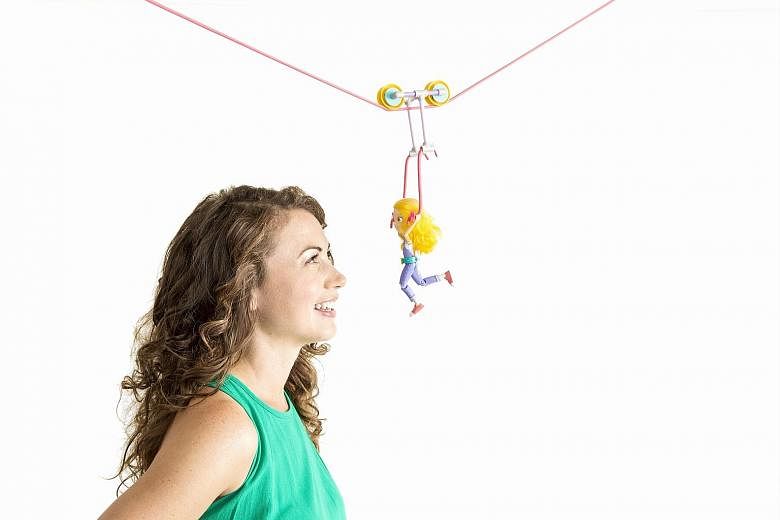Millennial kids raised with pink toys for girls and blue ones for boys are transitioning into parenthood themselves and finding that gendered playthings are still as rampant as they were in the 1990s. So they are doing one of the things this generation does best: Crowdfunding start-ups that they hope will change the landscape.
"Crowdfunding is definitely a trend we've been seeing in the last couple of years," said Ms Adrienne Appell, a spokesman for the Toy Industry Association. "It's allowing new ideas to permeate the market."
Toys proposed on these sites range from books and calendars to dolls and gadgets, with a growing number specifically aimed at tackling the shortage of science, technology, engineering and mathematics (Stem)-oriented toys for girls.
Kickstarter, a crowdfunding site, has seen a new campaign nearly every week geared towards encouraging or teaching young girls Stem, a spokesman for the company said.
Some toy start-ups which have turned to non-traditional funding sources like crowdsourcing are seeing big payouts.
GoldieBlox, a toy set that teaches girls engineering, initially used Kickstarter to garner funding and interest and raised more than US$285,000 (S$400,482). The product is now sold at 6,000 stores, a company spokesman said.
Linkitz, which aims to sell interactive armbands that teach girls under eight how to code, was able to crowdfund more than US$100,000, founder and computer scientist Lyssa Neel said.
Mr Ian Harkin, co-founder of start-up toy company Arklu, said crowdfunding can validate start-up toymakers' products and create a customer base before launching.
His company produces the Lottie Doll, which can be dressed as different characters, such as a stargazer or robot builder. It sold 300,000 dolls and 200,000 accessories last year, he said.
Arklu did not use crowdfunding to launch the product because he said the financing technique is less developed in Britain. But he added the consumer demand for the less gendered products is definitely there.
Still, only 37 per cent of Kickstarter projects are able to successfully be funded, according to the company's website and those that are must then figure out how to turn that upfront cash into a marketable product.
Ms Stephanie Wissink, a senior research analyst for Piper Jaffray, said this holiday season will be the first to judge the success of these new products that crowdfunding consumers seem willing to buy.
"Millennials are the first generation that grew up with equality in opportunity between men and women," she said. "Little girls who are buying these dolls are looking at women who tend to be working, career-focused and a little more equalised.
"Plus, let's be real, this generation of nine- and 10-year-olds has never known a world without mobile devices."
Ms Wissink said she expects more major toy companies will eventually expand their offerings to include more Stem toys marketed to all children.
At least one major big box store is already moving in that direction. This past week, Target announced it would stop labelling its toys and bedding with "boys" and "girls" sections, saying the decision was driven by feedback from shoppers.
By drawing girls into Stem at an early age, the idea is that these games and gadgets have the potential to shift the demographics of an entire industry.
"Boys are given tech toys earlier and so they have more familiarity with it. Then when they get into computer science classes, they speak up," said Ms Neel.
BLOOMBERG

